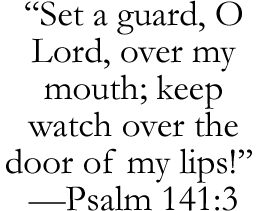In Defense of Clean Speech in Christian Fiction, Part 4
 See Part 1, Part 2, Part 3, Part 4, Part 5, Part 6, Part 7, and Part 8.
See Part 1, Part 2, Part 3, Part 4, Part 5, Part 6, Part 7, and Part 8.
What Is Unclean Speech?
This past August, Kaitlin Nootbaar, a high school valedictorian in Oklahoma, realized she’d made a big mistake. During her May graduation speech, she’d used a curse word inspired by one of the Twilight movies.
Now, because of this infraction, the school was withholding her diploma. According to the high school superintendent, Kaitlin had “used language that was inappropriate for a graduation exercise.”
Why do I bring up this surprising story? Because it shows that even the world sometimes reveals a collective conscience, at least when it comes to bad language in certain contexts. I’ve observed this in my own experience.
During my brief stint at FedEx in 2006, I heard language that would curl your hair. But once fellow employees learned I’d worked at a Bible college for a decade, they cleaned up their act in a hurry. I didn’t have to say a word—they just instinctively knew the standard vocabulary was inappropriate for a Christian.
We Should Know Better
What’s my point? If even our culture has a general sense that certain language is inappropriate for certain audiences, then why are some Christian authors trying so hard to justify using profanity and vulgarity many Christians don’t want any part of? Apparently, some segments of the world have a better handle on audience than some Christian novelists do.
And really, if anyone should know what language to shun, it should be Christians. That’s because God has told us.
Let no corrupting talk come out of your mouths [or pens], but only such as is good for building up, as fits the occasion, that it may give grace to those who hear. And do not grieve the Holy Spirit of God, by whom you were sealed for the day of redemption. (Eph. 4:29-30)
Let there be no filthiness nor foolish talk nor crude joking,which are out of place, but instead let there be thanksgiving. (Eph. 5:4)
But now you must put them all away: anger, wrath, malice, slander, and obscene talk from your mouth [or pen]. (Col. 3:8)
Let’s park at Ephesians 4:29-30. According to John MacArthur, the word corrupting comes from a Greek word that refers to “rotten fruit, vegetables, and other spoiled food.” John goes on to say,
Foul language should never proceed from the mouth of a Christian, because it is totally out of character with his newness of life. Unwholesome language should be as repulsive to us as a rotten apple or a spoiled piece of meet. Off-color jokes, profanity, dirty stories, vulgarity, double entendre, and every other form of corrupt talk should never cross our lips. (John MacArthur, The MacArthur New Testament Commentary: Ephesians [Chicago: Moody, 1986], 187.)
I would add: nor should it color anything we Christians write.
Of course, we’re all guilty of corrupt talk at some point. Maybe not profanity or vulgarity, but certainly words that gossiped about a brother in Christ or whined about a God-ordained trial in our lives. We’re all guilty, but we’re in good company.

Remember, the apostle Peter not only denied our Lord three times but cursed and swore (Matt. 26:74). Like Peter, we struggle to control our tongues because what comes out of our lips reveals what’s in our hearts (Matt. 12:34-37).
As we learned in Part 3, we all need Jesus to clean up our hearts—which is how we will get clean speech. Jesus makes us new creatures—off with the old, on with the new (2 Cor. 5:17). We can meditate on Philippians 4:8 with the minds of new men and women of God who share in God’s holiness.
What Christians Should Avoid
John Piper offers a helpful list of three possible areas of expression Paul referred to in Ephesians 4:29. This is what Christian authors should avoid.
1. Taking the Name of the Lord in Vain—This relates to using God’s precious name carelessly in a moment of anger or surprise. Just watch the “reveal” at the conclusion of any home-decorating-surprise show, and you’ll hear plenty of examples.
2. Trivializing Terrible Realities—This is language that makes light of hell and damnation. Telling someone to go to the place that burns forever would fall into this category. Piper says, “It’s simply a contradiction to believe in the horrible reality of hell and use the word like a punctuation mark for emphasis when talking about sports or politics.”
3. Referencing Sex and the Body in Vulgar Ways—This occurs, Piper says, when “people take good things that God has made, and use them like mud to smear on whatever they get upset about.” I would add to this list crude references to certain parts and functions of human anatomy that are private for a reason.
This list should come as no surprise. Yet what is surprising (or should be) is that I could list right now (on Nov. 9, 2012) several currently popular Christian novels that venture into all three areas of unbiblical expression.
And sadly, these novels must sell pretty well; new releases are getting edgier all the time. That means a sizable Christian audience has embraced this trend.
Lest some fear I’m coming on too strong, let me say this: I’m certain most, if not all, of my Christian novelist colleagues would agree with what God says about clean speech, and they would (hopefully) never use unclean speech in dialogue with other Christians.
But many have compartmentalized their fiction in a way they say exempts it from these biblical standards. “After all,” they say, “that’s how my unsaved character would talk.” Are their arguments for realism and art valid? In future installments we will use Scripture to explore their reasons.
What about you? Have you lately read any Christian novels that troubled you because of violations in the realm of clean speech? What can we do about this problem? Be specific. I’ll start. First, let’s pray for these authors; they have a tremendous God-given responsibility to present an accurate picture of Christ to our world. Let’s pray they’ll get it right.










Another great post. Loved the verses and examples–I’d forgotten that even Peter swore!
Hey, thanks, Heather. It’s always nice to hear from you. I’m just trying to make the biblical case. Folks can then decide for themselves how they want to respond.
I agree wholeheartedly, Adam, and am so distressed to see this trend in Christian publishing. It is understandable that some characters in a novel might swear, but we don’t need to be treated to the details. The Holy Spirit apparently didn’t see the need to tell us explicitly what Peter said: it was enough just to tell us what happened.
Thanks for chiming in, Barbara. These are interesting times, aren’t they? It is certainly not the Christian fiction industry I grew up with. My, how times have changed. God can still do His work and raise up an army of those who will stand up for standards of clean speech and reflect His character.
About Peter, yes, I plan to address that. Thanks for the reminder. It’s a big topic with so many angles; that’s why I’m taking it slowly in parts. Thanks for your support.
Oh, and if you think of an angle I’m missing, please send me a note. I don’t want to forget any important points, but there’s a lot to cover.
I agree 100%. These novels don’t need that bad language and the descriptive scenes. We still have imaginations don’t we? I am really offended when novels or movies have bad language or inappropriate scenes. Whey would I invite that into my home?
Great article. I like how you detail the 3 kinds of language to avoid. Art may put an excerpt in the bulletin on Sunday. We find the OMG expression has become so commonplace that we find Christians even use it. Maybe they think of the “God” part as god, like “Oh my stars.” We have had to explain this in church Sunday morning and our youth/kids night repeatedly as somehow they don’t see this as using God’s name in vain. Also I find a few Facebook Christians using language that I don’t think they really know the full meaning of. Thanks for a clear article on the subject.
Thanks, Deb. I’m glad the article is helpful. If you notice any holes in my content, please shoot me an e-mail. I’m trying to cover all the main bases in the argument and biblical position, but I may forget something along the way.
Exactly, Gladys. I appreciate your sounding off. Would Jesus sit there and watch it/read it with us?
Today is the first I’ve had a chance to catch up on the posts in this series, and I couldn’t agree more. Having all saved characters in a book usually isn’t realistic, and I think it’s just as problematic to have no real difference between saved and unsaved characters (not only in language and actions but in attitudes, priorities, and worldview).
But there are plenty of ways to portray unsaved characters, even especially unsavory ones, without using foul language or including explicit scenes/descriptions. Just because an unsaved character would use a certain word doesn’t mean he needs to use it to be realistic for the reader or to let the reader know what kind of person he is. Writers who use that excuse, in my opinion, either are being lazy in their writing or aren’t giving the reader enough credit.
The “OMG” expression has also been bothersome to me, especially on social networking sites and in texting. I see it used by Christian friends who I doubt would ever say or write the spelled-out version, yet I don’t see any difference between the two. One friend did confide to me years ago (when it first became widespread in texting) that she had started using it without knowing what it actually meant. She’d picked it up from friends and hadn’t realized what it stood for since her family didn’t use the full expression. There may be others who are that way. But for most people I think it’s just a lowering of standards. I think some actually believe that if “God” isn’t actually used, there’s no problem.
Thanks for joining the discussion, Naomi. I think this is such a needy topic because our world needs to see the difference in our lives. We need to be salt and light. If we’re just like the world and offer the same ol’ thing, why would they be interested in Christianity? We can show the difference in our books too.
Yes, there are so many ways to communicate that a character is unsavory without actually depicting the coarse language or innuendos. You could just say that every fifth word that came out of his mouth would have made my grandma blush. Or something like that. Readers “get it”; they aren’t as stupid as we think. While dialogue is great for showing characterization, actions are even more so.
As I’ve said in a previous post, I really do believe God holds us to a higher standards. We are the redeemed. God is counting on us to give the world an accurate representation of who He is. We weaken the gospel by giving mixed messages. Thanks for chiming in.
Pingback: Laudable Linkage « Stray Thoughts
Pingback: In Defense of Clean Speech in Christian Fiction, Part 5 - |
Pingback: In Defense of Clean Speech in Christian Fiction, Part 3 - |
Pingback: In Defense of Clean Speech in Christian Fiction, Part 8 - |